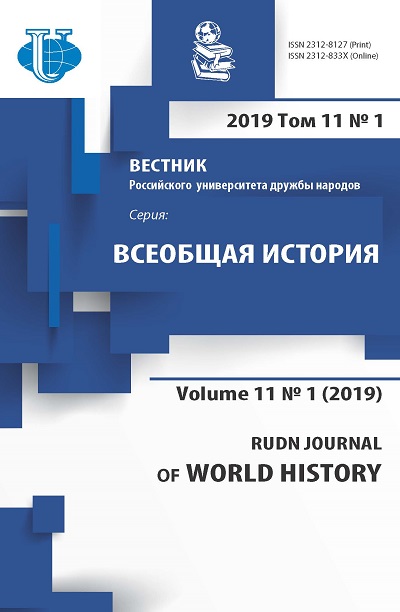Pax Romana и римский «империализм» в I в. н.э
- Авторы: Никишин В.О.1
-
Учреждения:
- Московский государственный университет имени М.В. Ломоносова
- Выпуск: Том 11, № 1 (2019)
- Страницы: 76-90
- Раздел: Античный мир
- URL: https://bakhtiniada.ru/2312-8127/article/view/332295
- DOI: https://doi.org/10.22363/2312-8127-2019-11-1-76-90
- ID: 332295
Цитировать
Полный текст
Аннотация
Статья посвящена такому историческому феномену, как римский «империализм» в эпоху Августа и его ближайших преемников. Несмотря на то что основатель Принципата провозгласил наступление «Августова мира», он провел несколько завоевательных войн (например, в Испании и Германии). Однако уже Тиберий отказался от «агрессивного империализма», после чего империя перешла к обороне на всех рубежах. Императоры I в. лишь время от времени предпринимали наступательные акции (например, в Армении или Британии). Вероятно, причин отказа римлян от политики экспансии было две. Во-первых, к тому времени они уже завоевали практически все Средиземноморье и расширять границы империи более не имело смысла. Во-вторых, создание профессиональной армии привело к заметному снижению уровня милитаризации римского общества, которое отныне было кровно заинтересовано в сохранении мира и стабильности на всем пространстве «римского мира».
Об авторах
Владимир Олегович Никишин
Московский государственный университет имени М.В. Ломоносова
Автор, ответственный за переписку.
Email: cicero74@mail.ru
кандидат исторических наук, старший преподаватель кафедры истории древнего мира исторического факультета
Ломоносовский пр., 27-4, Москва, Россия, 119991Список литературы
- Abramzon M.G. Monety kak sredstvo propagandy oficialnoy politiki Rimskoj Imperii [The Coins as a mean of propaganda of the official policy of the Roman Empire]. М., 1995.
- Knabe G.S. Kornelij Tacit. Vremya. Zhizn’. Knigi [Cornelius Tacitus. Time. Life. Books]. М., 1981.
- Nikishin V.O. Kak kultura preodolela negativnyj stereotip: portret mavretanskogo carya Juby II v kontekste rimskih etnicheskih predrassudkov [How the culture overcame a negative stereotype: the portrait of Mauretanian king Juba II in the context of the Roman racial prejudices] // Egipet i sopredel’nye strany [Egypt and neighbouring countries]. Vyp. 2. M., 2017. S. 43–59.
- Smykov E.V. Novye podhody k issledovaniju rimskoj vostochnoj politiki [The new approaches of research of the Roman eastern policy]. Saratov, 2010.
- Shtaerman E.M. Social’nye osnovy religii drevnego Rima [Social bases of the religion of Ancient Rome]. М., 1987.
- Amici – socii – clientes? Abhängige Herrschaft im Imperium Romanum (Berlin Studies of the Ancient World. Vol. 31) / Hrsg. E. Baltrusch und J. Wilker. Berlin, 2015.
- Balsdon J.P.V.D. Romans and Aliens. L., 1979.
- Bellen H. Metus Gallicus – Metus Punicus. Zum Furchtmotiv in der römischen Republic / AAWM. 3. 1985.
- Braund D.C. Rome and the Friendly King: The Character of the Client Kingship. L., 1984.
- Brunt P.A. “Laus imperii” // Imperialism in the Ancient World / Eds. P.D.A. Garnsey and C.R. Whittaker. Cambridge, 1978. P. 159–191.
- Brunt P.A. Roman Imperial Themes. Oxford, 1990.
- Burian J. Latrones. Ein Begriff in römischen literarischen und juristischen Quellen // Eirene. Studia Graeca et Latina. 21. 1984. S. 17–23.
- Cornell T. The end of Roman imperial expansion // War and Society in the Roman World / Leicester-Nottingham Studies in Ancient Society. Vol. 5 / Eds. J. Rich and G. Shipley. L., 1993. P. 139–170.
- Eckstein A.M. Conceptualizing Roman Imperial Expansion under the Republic // A Companion to the Roman Republic / Eds. N. Rosenstein and R. Morstein-Marx. Oxford, 2006. P. 565–589.
- Eckstein A.M. Mediterranean Anarchy, Interstate War, and the Rise of Rome. Berkeley and Los Angeles, 2006.
- Edwell P. Definitions of Roman Imperialism // A Companion to Roman Imperialism (History of Warfare. Vol. 81) / Ed. D. Hoyos. Leiden-Boston, 2013. P. 39–52.
- Ghio G. Roman Soldiers on the Spot: Integration and Issues. A case study based on the province of Egypt (I–II century AD). Leiden, 2017–2018.
- Giuffre V. “Latrones desertoresque” // Labeo. Rassegna di diritto romano. 27. 1981. P. 214–218.
- Gruen E.S. The Hellenistic World and the Coming of Rome. Vol. 1. Berkeley, 1984.
- Grünewald Th. Bandits in the Roman Empire: Myth and Reality. L.; N.Y., 2004.
- Harris W.V. War and Imperialism in Republican Rome, 327 – 70 BC. Oxford, 1979.
- Kroll W. Die Kultur der ciceronischen Zeit. Leipzig, 1933.
- Lintott A. Imperium Romanum: Politics and Administration. L.; N.Y., 1993.
- Madsen J.M. The Provincialisation of Rome // A Companion to Roman Imperialism (History of Warfare. Vol. 81) / Ed. D. Hoyos. Leiden-Boston, 2013. P. 305–318.
- Millar F. Rome, the Greek World, and the East / Eds. H.M. Cotton and G.M. Rogers. Vol. 2. Government, Society, and Culture in the Roman Empire. L., 2004.
- Paterson J. Transalpinae gentes: Cicero, De re publica 3, 16 // CQ. 1978. 28. P. 452–458.
- Pitts L.-F. Relations between Rome and the German “Kings” on the Middle Danube in the First to Fourth Centuries A.D. // JRS. 79. 1989. P. 45–58.
- Potter D. The Limits of Rower // A Companion to Roman Imperialism (History of Warfare. Vol. 81) / Ed. D. Hoyos. Leiden-Boston, 2013. P. 319–332.
- Richardson J.S. Imperium Romanum: Empire and the Language of Power // JRS. 81. 1991. P. 1–9.
- Stone M. The Genesis of Roman Imperialism // A Companion to Roman Imperialism (History of Warfare. Vol. 81) / Ed. D. Hoyos. Leiden-Boston, 2013. P. 23–38.
- Vogt J. Ciceros Glaube an Rom. Darmstadt, 1963.
- Whittaker C.R. Frontiers // CAH. 2nd ed. Vol. XI. The High Empire, AD 70–192 / Ed. A.K. Bowman. Cambridge, 2008. P. 293–319.
- Woolf G. Roman peace // War and Society in the Roman World / Leicester-Nottingham Studies in Ancient Society. Vol. 5 / Eds. J. Rich and G. Shipley. L., 1993. P. 171–194.
Дополнительные файлы









